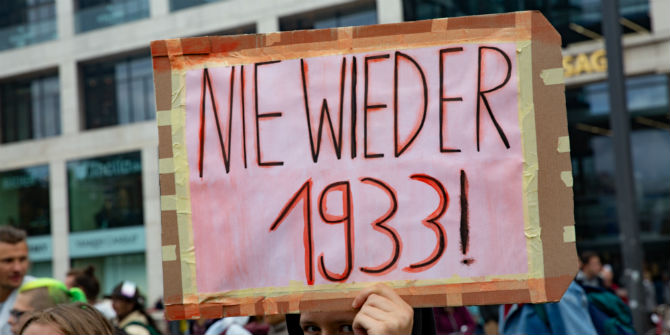‘Democracy crisis’, ‘illiberalism’, ‘authoritarian regression’, ‘executive takeover’. The dark political mood in Europe has generated its own language in recent years. In the corridors of power, there is often a strong agreement on what needs to be defended: liberalism, the rule of law, judicial independence, free media, and individual rights. In other words, across the European Union, many recognise that the liberal constitutional rights that underpin democratic societies are in danger. However, defending liberalism is not enough, argues Luke Cooper (Another Europe is Possible/LSE).
Democracy is, of course, a deeply contested concept in itself. But the ‘model’ that became a global norm at the close of the last century combined liberal constitutionalism based on individual freedoms with representative politics and free elections. Europe’s new authoritarian right has launched an offensive against the constitutional liberal aspect of democracy. The focus on protecting these liberties is quite logical in this context. But is it enough? If we look closer at the questions of why and how the far right is emerging, as well as what exactly it represents in historical terms, this suggests an alternative approach is needed. We need to see the rise of the new authoritarians as an expression of problems in how our democracy is working.

The challenge to liberalism
Hungary’s Viktor Orbán has gone further than many of his co-thinkers across Europe to promote ‘illiberal democracy’ as a new ideology for the continent. Quite explicitly rejecting the liberal component of democracy, it advocates instead crude majoritarianism. According to this argument, liberal rights are simply a conspiracy of the elite against the majority. Orbán and his ideological supporters see democracy as the absolute rights of majorities – and crucially their representatives – to do as they please. This political thinking does not acknowledge the rights of minorities; indeed, it argues directly and explicitly that they do not have rights vis-à-vis the majority. Inevitably this solipsistic reasoning leads one to recall the warnings of those that argued for unity between liberalism and democracy in the nineteenth century.
‘Democratic republics’, said Alexis de Tocqueville in his famous book, Democracy in America, ‘risk perishing by the bad use of their power, and not by powerlessness’ (p. 425). ‘If liberty is ever lost in America’, he added, ‘it will be necessary to lay the blame on the omnipotence of the majority that will have brought minorities to despair…’ (p. 425). For de Tocqueville and other nineteenth-century liberals this problem arose out of power centralisation. Constitutional liberties, therefore, needed to constrain the actions of majorities, creating a rules-based system that would underpin democratic stability.
These observations have a power in contemporary Europe. Britain’s lack of a codified constitution has left it exposed to the authoritarian actions of a government that appears to not accept the established norms of its democratic system. In Slovakia, the system of proportional representation was a factor in constraining the power of the corrupt Robert Fico regime – and, conversely, the use of the ‘first past the post’ electoral system in Hungary has had the opposite effect, increasing Orbán’s control. In many European countries, there is a strong case for making human rights and constitutional liberties more strongly embedded in the political system. However, the states created by constitutional liberals in the nineteenth century have not always been strong protectors of freedom. Recognising this led to the push to give human rights global protections through international rules. And so it is natural that Europe’s own rules-based system would become a target for those that reject liberal freedoms.
But defending this alone is not sufficient. It deals strictly with the symptoms of authoritarian regression, rather than tackling the problem directly at its roots. If we focus only on defending the liberal component of liberal democracy, we risk ceding too much of the argument. We must also fight on the terrain of the democratic element of liberal democracy: the empowerment of citizens to run their society. To effectively confront the new authoritarians we must acknowledge that they are a symptom of a deeper democratic crisis that emerged over the last three decades. Recognising that democracy won a flawed victory in the early 1990s is not, of course, a new insight. From Peter Mair’s account of the hollowing out of Western democracy, to Colin Crouch’s use of the term ‘post-democracy’, and Chantal Mouffe’s warning that democracy required adversarial politics, sociologists and political scientists have long argued that democracy stood at a paradoxical conjuncture after the fall of the Iron Curtain. On the one hand, democratic systems had expanded radically; on the other, the lack of substantive ideological argument diminished their representative function. The lack of ideological choice undermined the efficacy of democratic processes, giving voters insufficient grounds to go to the ballot boxes.
The problem democratic systems faced arose because of the ‘too severe’ defeat that socialism suffered in the 1980s and 1990s. The rise of neoliberal capitalism, and its extraordinarily destructive experiment on former communist countries (which led to depressionlike conditions with states losing, on average, 30 per cent of their GDP), created what Mair referred to as a void in political systems characterised by technocratic governance and the ‘evacuation’ of the ‘zone of engagement’ by parties (p. 54). The demand to be represented amongst populations is a response to this hollowing out of democracy. The vulgar majoritarianism promoted by the new authoritarians can be placed in this context. It is an attempt to ‘fill the void’ through an ethnocentric identity and set of beliefs. ‘The people’ are imagined as an ethnically homogenous group with coherent interests against foreign enemies – typically migrants and ethnic minorities. Ideology is reinserted into the system but in a dangerous form. The ‘void’ becomes filled, but by a new despotism rather than a revivified democratic politics.
This is why defending procedural democracy – the rules-based system that underpins competitive, multi-party politics – is a necessary but insufficient response to the new far-right. Progressives and the left need their own rejoinder to the demand to be represented. A politics based on substantive democratisation, which gives citizens more control over the forces shaping their lives, can respond to this in a participatory and progressive way. It will require entirely reconsidering the neoliberal assumptions that have dominated our politics for the last decades. Europe should embrace the new political experiment this calls for. Otherwise the demand for representation will be answered in a deeply destructive way that threatens the democratic order itself.
This post represents the views of the author and not those of the Brexit blog, nor the LSE. “The future of European democracy” series is part of an on-going collaboration between the Visions of Europe project at the London School of Economics and the Europe’s Futures programme at the Institute of Human Sciences in Vienna. Image by: W. Kompała / KPRM Kancelaria Premiera, file licensed under the Creative Commons Attribution-Share Alike 2.0 Generic license.






